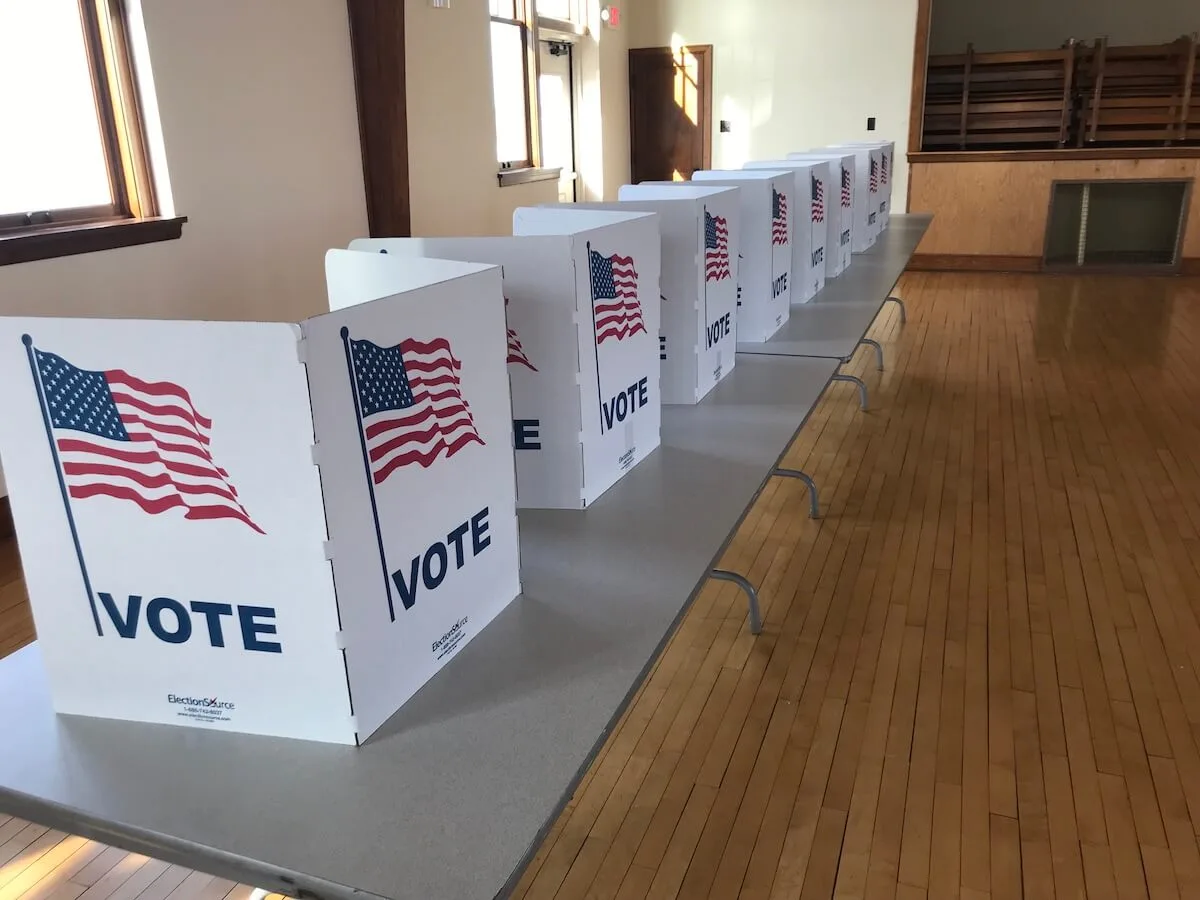
#image_title
#image_title
Spring elections include another batch of local referendums due to restrictions on school boards from legislative Republicans.
With tens of millions of dollars being spent, Wisconsin’s Supreme Court election is understandably getting the lion’s share of attention lately. However, the high-profile race simply holds the top spot on a ballot that includes many other important choices to be made by voters, such as who will serve on their local school boards, town boards, other local nonpartisan offices, and judgeships.
Dozens of communities will also decide whether their local school districts will be allowed to exceed Republican-imposed budget limits to spend money on new construction: a frustration for educators as illustrated during our spring election coverage in April 2020, April 2021, and April 2022.
With Election Day just a few days away, here are 10 important items that could be on your April 4 ballot:
1 – Mayors
Progressive leaders in three cities are seeking reelection as their city’s mayor. Incumbent Eric Genrich in Green Bay, a former Democratic legislator, is seeking a second four-year term, but is being challenged by Brown County administrative director Chad Weininger, a former Republican legislator. In Madison, Satya Rhodes-Conway is facing opposition from Madison school board president Gloria Reyes. Racine Mayor Cory Mason, also a former Democratic legislator, is running for a second four-year term—he’s opposed by city council member Henry Perez. In the Madison suburb of Middleton, two city council members are running for an open seat.
2 – Legislature (Special Election)
Normally, spring elections are held for local, nonpartisan races, while partisan posts, including seats in the Legislature, are decided in the fall. But there will be one legislative special election next week to fill the vacancy in the 8th Senate District in the suburbs north of Milwaukee, created by former Sen. Alberta Darling’s retirement last December.. The candidates are Democratic attorney Jodi Habush-Sinykin and Republican state Rep. Dan Knodl.
3 – Amending the State Constitution
Republican legislators placed a pair of proposed constitutional amendments on the ballot that would expand the range of crimes in which cash bail could be applied to defendants, a move that allows lawmakers to claim they’re being tough on crime. But Democratic Rep. Evan Goyke of Milwaukee said real bail reform recommendations from a bipartisan legislative study committee should have been adopted instead. He said on UpNorthNews Radio that he recommends voters oppose the changes.
“We wanted to move away from using only money as the determination of whether you get out of jail or not and create a system that would make that decision based on the risk that the individual poses of either flight or re-offending,” Goyke said.
4 – Advisory Referendum or Ballot Mischief?
Along with the two constitutional amendments about bail, voters will see an advisory referendum from Republican legislators on their ballot. If you’re confused about the question being asked because you think it’s about a matter already found in state law, you’re right– it is.
The referendum asks: “Shall able-bodied, childless adults be required to look for work in order to receive taxpayer-funded welfare benefits?” Answering “yes” would change nothing because applicants for unemployment benefits need to search for work multiple times per week, and food benefits (often called food stamps) also come with a work requirement for adults under age 50 who don’t have children at home and aren’t disabled.
Democrats have accused Republicans of adding the referendum in order to gin up conservative voter turnout and help former Justice Dan Kelly in the state Supreme Court election. The Democratic lawmakers said that if Republicans really wanted to measure public opinion on an issue, there are other matters where voters could have an impact on changing state law. (See below.)
5 – County Circuit Judges
There are 261 circuit court judgeships across Wisconsin’s 72 counties, with each up for election every six years. There are 49 seats on the ballot in 2023, but only 11 are contested races. Some elections are for newly-created posts; others feature gubernatorial appointees who are now seeking a full term. In only four counties—Oneida, Washington, Waukesha, and Winnebago—are incumbent judges facing a challenger.
6 – Appeals Court Judges
Wisconsin has 16 appeals courts, the level between county circuit courts and the state Supreme Court. The state is divided into four districts and the judges in the various districts serve six-year terms. In 2023, two districts are up for reelection and only one appeals judge is facing opposition—in District 1, which is only Milwaukee County. The other seat will be filled by Dane County Judge and former legislator Chris Taylor.
7 – Town Boards
Wisconsin has 1,250 towns—those often square-shaped units of government within a county that are not incorporated into cities or villages. They are governed by a town board made up of a chairperson and two to four supervisors. Towns may also have a clerk and a treasurer—or a combined clerk-treasurer—who may also be elected.
8 – Other Local Officials
Outagamie County Executive Tom Nelson, a former Democratic legislator and 2022 primary candidate for US Senate, is running for a fourth four-year term. There is also a contested election for the village president in the Green Bay suburb of Howard. And in the Racine County Village of Pleasant Prairie, home to the controversial Foxconn project, the village president and three village board members are facing opposition as they run for reelection.
9 – School Boards
Wisconsin has more than 800,000 children enrolled in 421 public school districts, according to the Wisconsin Association of School Boards, which are governed by nearly 2,800 school board members who stand for election each spring as their terms of office, generally three years, come due.
10 – School Referendums
There are 82 local school district referendums on the ballot in 68 school districts, according to the Wisconsin Association of School Boards (WASB). Of those 82 total referendums, 53 are known as operating referendums—seeking voters’ permission to exceed Republican-imposed revenue limits. Those 53 are on top of last year’s record 92 measures.
According to WASB, 249 of Wisconsin’s 421 school districts (or nearly 60%) are currently functioning under an operational referendum.
There will be 29 borrowing referendums on the ballot—the kinds of school referendums that ask voters for approval to issue new bonds (i.e. borrow money) for major construction, remodeling, or maintenance projects for school facilities. Here are two examples:
- Marshfield is asking for nearly $100 million to make significant improvements to the high school, improve air conditioning in the elementary schools, and add space for classrooms that include career technology.
- Altoona is pursuing a $26 million proposal that would allow the district to buy a vacant business building and shift some elementary grades, along with other infrastructure, improvements, and maintenance.
While critics may point to the price tags and claim the measures will increase the local tax burden, supporters will note a January report from the Wisconsin Policy Forum that showed “Wisconsin’s state and local tax burden fell in 2022 to its lowest level on record. Local taxes as a share of income have never been lower in more than a half century of data.”
The report goes on to note that while state government revenues have grown 57% since 2010, local government revenue has grown by less than half that amount (24%) over the same period. So while the state Legislature is quibbling over a record $7 billion surplus, local school districts and municipalities have been forced to ask taxpayers for support as state shared revenue has fallen.
Not on the Ballot: The 1849 Abortion Ban and Fair Maps
Despite the many choices for voters on Tuesday, they are not allowed to directly weigh in on two significant matters that Democrats would like to put before voters.
Republicans shot down a proposal to let voters decide whether to keep the state’s near-total abortion ban, written in 1849 and put back into effect last year when right-wing justices on the US Supreme Court repealed Roe v. Wade. Abortion rights have consistently had broad bipartisan support in public opinion polls.
Fair maps are similarly popular among Wisconsin voters. The Wisconsin Fair Maps Coalition has tallied results in 56 counties where support to end political gerrymandering has come through local advisory referendums or county board resolutions.
While there are no referendums that specifically mention these issues, Supreme Court election watchers have said since the beginning of the campaign that these issues are essentially on the ballot as voters decide control of state’s highest court.
Politics

New Biden rule protects privacy of women seeking abortions
Under the new rules, state officials and law enforcement cannot obtain medical records related to lawful reproductive health care with the goal of...

Biden marks Earth Day by announcing $7 billion in solar grants
The Biden administration on Monday announced the recipients of its Solar For All Program, a $7 billion climate program that aims to lower energy...
Local News

Stop and smell these native Wisconsin flowers this Earth Day
Spring has sprung — and here in Wisconsin, the signs are everywhere! From warmer weather and longer days to birds returning to your backyard trees....

Your guide to the 2024 Blue Ox Music Festival in Eau Claire
Eau Claire and art go hand in hand. The city is home to a multitude of sculptures, murals, and music events — including several annual showcases,...





